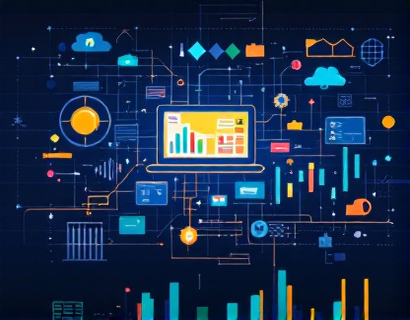AI Services Showcase: Unveiling Transformative Tech Solutions for Industry Leaders
In today's rapidly evolving technological landscape, artificial intelligence (AI) stands at the forefront of innovation, reshaping industries and redefining the way businesses operate. The AI Services Showcase serves as a comprehensive platform that highlights the latest advancements in AI technology, connecting users with cutting-edge solutions designed to enhance productivity and drive success across various sectors. This article delves into the transformative power of AI, exploring its applications, benefits, and the diverse array of services available to tech enthusiasts, developers, business leaders, and industry pioneers.
The Rise of Artificial Intelligence
Artificial intelligence has transitioned from a theoretical concept to a practical tool that is revolutionizing industries. With the ability to analyze vast amounts of data, learn from patterns, and make informed decisions, AI is becoming an indispensable asset for organizations seeking to improve efficiency and gain a competitive edge. From healthcare to finance, manufacturing to retail, AI technologies are being integrated into everyday operations, leading to significant advancements and innovations.
Understanding AI Services
AI services encompass a wide range of solutions that leverage machine learning, natural language processing, computer vision, and other AI technologies. These services are designed to automate processes, enhance decision-making, and provide insights that drive business growth. By utilizing AI services, organizations can streamline operations, reduce costs, and improve customer experiences.
Key Categories of AI Services
Machine Learning
Machine learning is a subset of AI that focuses on the development of algorithms that enable computers to learn from and make predictions based on data. This technology is widely used in various applications, including predictive analytics, recommendation systems, and fraud detection.
Natural Language Processing (NLP)
NLP enables machines to understand, interpret, and respond to human language. This technology powers chatbots, virtual assistants, and sentiment analysis tools, allowing businesses to enhance customer interactions and gain valuable insights from textual data.
Computer Vision
Computer vision involves the use of AI to interpret and understand visual information from the world. This technology is utilized in facial recognition, image classification, and autonomous vehicles, providing organizations with innovative ways to analyze and utilize visual data.
Robotic Process Automation (RPA)
RPA combines AI with automation to streamline repetitive tasks and processes. By automating routine activities, organizations can free up human resources for more strategic initiatives, ultimately improving productivity and efficiency.
AI-Powered Analytics
AI-powered analytics tools leverage machine learning algorithms to analyze data and provide actionable insights. These tools help organizations make data-driven decisions, identify trends, and optimize operations.
Benefits of AI Services
The integration of AI services into business operations offers numerous benefits that can significantly impact an organization's success. Here are some of the key advantages:
Enhanced Efficiency
AI services automate repetitive tasks, allowing employees to focus on higher-value activities. This leads to increased productivity and efficiency across the organization.
Improved Decision-Making
AI technologies analyze vast amounts of data quickly and accurately, providing organizations with insights that inform strategic decision-making. This data-driven approach minimizes risks and enhances overall performance.
Cost Reduction
By automating processes and improving efficiency, AI services can lead to significant cost savings. Organizations can reduce operational expenses while maintaining high levels of service quality.
Personalized Customer Experiences
AI enables businesses to analyze customer data and preferences, allowing for personalized marketing and customer service. This tailored approach enhances customer satisfaction and loyalty.
Scalability
AI services can easily scale to meet the growing demands of a business. As organizations expand, AI solutions can adapt to handle increased workloads without compromising performance.
Exploring AI Solutions Across Industries
AI services are not limited to a specific sector; they are being adopted across various industries, each benefiting from the unique capabilities of AI technology. Here are some examples of how different sectors are leveraging AI solutions:
Healthcare
In the healthcare industry, AI is transforming patient care and operational efficiency. AI-powered diagnostic tools analyze medical images, assist in disease detection, and provide personalized treatment recommendations. Additionally, AI chatbots are being used to triage patients and answer common health-related queries, improving access to care.
Finance
The finance sector is utilizing AI for risk assessment, fraud detection, and algorithmic trading. Machine learning algorithms analyze transaction patterns to identify anomalies and potential fraud, while AI-driven analytics provide insights for investment strategies and portfolio management.
Manufacturing
AI is revolutionizing manufacturing processes through predictive maintenance, quality control, and supply chain optimization. By analyzing data from machinery and production lines, AI can predict equipment failures, ensuring minimal downtime and maximizing productivity.
Retail
In retail, AI enhances customer experiences through personalized recommendations and inventory management. AI algorithms analyze customer behavior and preferences, enabling retailers to offer tailored promotions and optimize stock levels based on demand forecasts.
Transportation
The transportation industry is experiencing significant advancements through AI technologies such as autonomous vehicles and route optimization. AI systems analyze traffic patterns and optimize delivery routes, reducing fuel consumption and improving delivery times.
Integrating AI Services into Your Business
For organizations looking to harness the power of AI, integrating AI services into existing operations requires careful planning and execution. Here are some steps to consider:
Identify Business Needs
Begin by assessing your organization's specific needs and challenges. Determine which processes could benefit from AI integration and how AI can address those pain points.
Research Available Solutions
Explore the diverse array of AI services available in the market. Compare features, capabilities, and pricing to identify solutions that align with your business objectives.
Develop a Strategy
Create a comprehensive strategy for implementing AI services. This should include timelines, resource allocation, and key performance indicators (KPIs) to measure success.
Engage Stakeholders
Involve key stakeholders in the decision-making process. Ensure that employees understand the benefits of AI integration and provide training to facilitate a smooth transition.
Monitor and Optimize
After implementation, continuously monitor the performance of AI services. Gather feedback, analyze results, and make necessary adjustments to optimize outcomes.
Future Trends in AI Services
The field of artificial intelligence is constantly evolving, with new trends and advancements emerging regularly. Here are some future trends to watch in AI services:
Explainable AI
As AI systems become more complex, the need for transparency and interpretability is growing. Explainable AI focuses on developing models that provide clear explanations for their decisions, enhancing trust and accountability.
AI Ethics and Governance
With the increasing adoption of AI, ethical considerations are becoming paramount. Organizations are prioritizing the development of ethical guidelines and governance frameworks to ensure responsible AI use.
AI in Edge Computing
Edge computing involves processing data closer to the source rather than relying on centralized data centers. AI is being integrated into edge devices, enabling real-time data analysis and decision-making.
AI and IoT Integration
The convergence of AI and the Internet of Things (IoT) is creating new opportunities for automation and data analysis. AI algorithms can analyze data from IoT devices, leading to smarter and more efficient systems.
Continued Growth of AI Startups
The AI startup ecosystem is thriving, with new companies emerging to address specific industry challenges. This growth is driving innovation and expanding the range of AI services available to businesses.
Conclusion
The AI Services Showcase provides a valuable resource for organizations seeking to explore and integrate transformative AI solutions. By understanding the capabilities and benefits of AI services, businesses can unlock new opportunities for growth and innovation. As AI technology continues to advance, staying informed about the latest trends and developments will be crucial for industry leaders looking to maintain a competitive edge. Embracing AI is not just a trend; it is a strategic imperative for organizations aiming to thrive in the digital age.










































